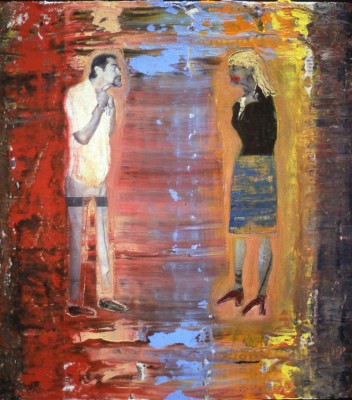So now let's take a look at how Dadaist ideas represented to audiences in highly unconventional... well... I am not even sure how to categorize these theatrical events.
現在讓我們來看看達達主義思想如何為不同尋常的觀眾表演,我甚至不知道怎樣對這些戲劇性事件進行分類。
I suppose you just have to call them shows.
我想你們就叫它們“表演”就行。
These shows started in Zurich in a place called the Cabaret Voltaire.
這些表演最初在蘇黎世的一個叫伏爾泰酒館的地方上演。
The rejection of classical western art, well, you see this in the nature of what took place at the Cabaret Voltaire.
對古典西方藝術的摒棄——你能看出這就是伏爾泰酒館里表演的本質。
They didn't put on plays or operas there.
他們沒有上演戲劇或歌劇。
What they did was throw out all conventions.
他們所做的就是把所有的傳統扔掉。

They mixed everything and anything together.
他們把所有的東西都混在一起。
They would... it might start with somebody reading a poem.
他們會……可能從某人朗誦一首詩歌開始。
Then somebody else playing an instrument, followed by a display of paintings, followed by somebody else chanting, followed by somebody else banging on a big drum, and someone dressed in a robot costume jumping up and down.
然后一些人會演奏樂器,接著會有繪畫展出,然后有人唱贊美詩,又有人猛敲大鼓,還有人穿著機器人戲服上躥下跳。
So it's not like a play.
這不是話劇。
There's no real plot development here like you'd find in the traditional theatrical performance.
這里面沒有真正的,你會在傳統劇院戲劇里的情節發展。
The performers at the Cabaret Voltaire would also get the audience involved, which was extremely unusual.
伏爾泰旅館里的表演者會讓觀眾參與進來,這非常罕見。
Think about a traditional play.
想想傳統戲劇吧。
The action's self-contained.
表演是不受他人影響的。
The actors act as if there is no one watching, right?
演員表演得似乎沒人在看,對吧?
It's like a world unto itself.
就是一個自己的世界。
Well, at the Cabaret Voltaire, audience members could get up on stage and dance, or chant, or shout and sing from their seats.
在伏爾泰旅館,觀眾能走上舞臺,跳舞、唱圣歌,或在座位上大聲叫喊,大聲歌唱。
And every night would be different, because there would be a different audience and a different set of acts and displays.
每天晚上都不一樣,因為觀眾都不一樣,表演內容和展覽也不一樣。
So all these could get pretty chaotic.
這一切都非常混亂。
No barriers between the performers and the audience, and no barriers between kinds of art either.
表演者和觀眾之間沒有明顯的界限,正如不同的藝術之間也無界限。
Think about it: poetry, paintings, music, dance... all on the same stage and often at the same time!
想想吧:詩歌、繪畫、音樂、舞蹈……這一切都在同一個舞臺上,而且往往在同一時間。
This is what the Dadaists had in mind.
這就是達達主義者想的東西。
When they set out to make art that reflected their own idea of reality, it didn't make sense.
當他們決定要創造能反映自己對現實的想法的藝術時,都是不合理的。
But why should it? !
但為什么要合理呢?
What is the main purpose of the lecture?
這節課主要講了什么?
Why does the professor mention a stool with a bicycle wheel mounted on top?
為什么教授提到了頂上有自行車輪的凳子?
According to the professor, why did some Dadaist write poetry by pulling words out of a hat?
根據教授所言,為什么一些達達主義者通過從帽子里抽出單詞寫詩?
What does the professor identify as aspects of traditional play?
教授將什么歸為傳統戲劇的元素?
According to the professor, what contributed to the chaotic nature of the performances at the Cabaret Voltaire?
根據教授所言,什么造成了伏爾泰酒館里本質混亂的表演?
Why does the professor say this: I suppose you just have to call them shows.
為什么教授要說這句話:我猜你們就叫它們“表演”好了?










